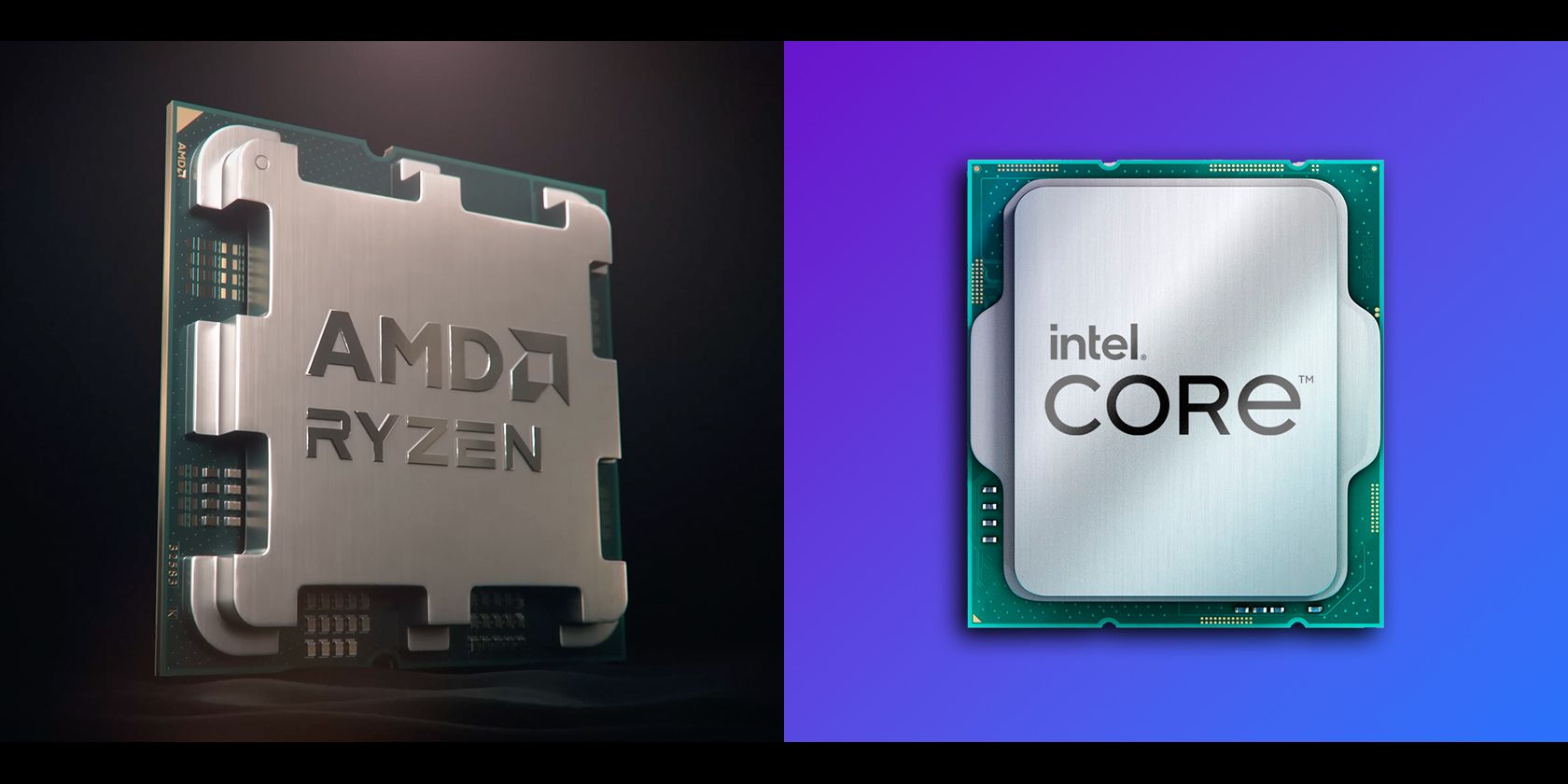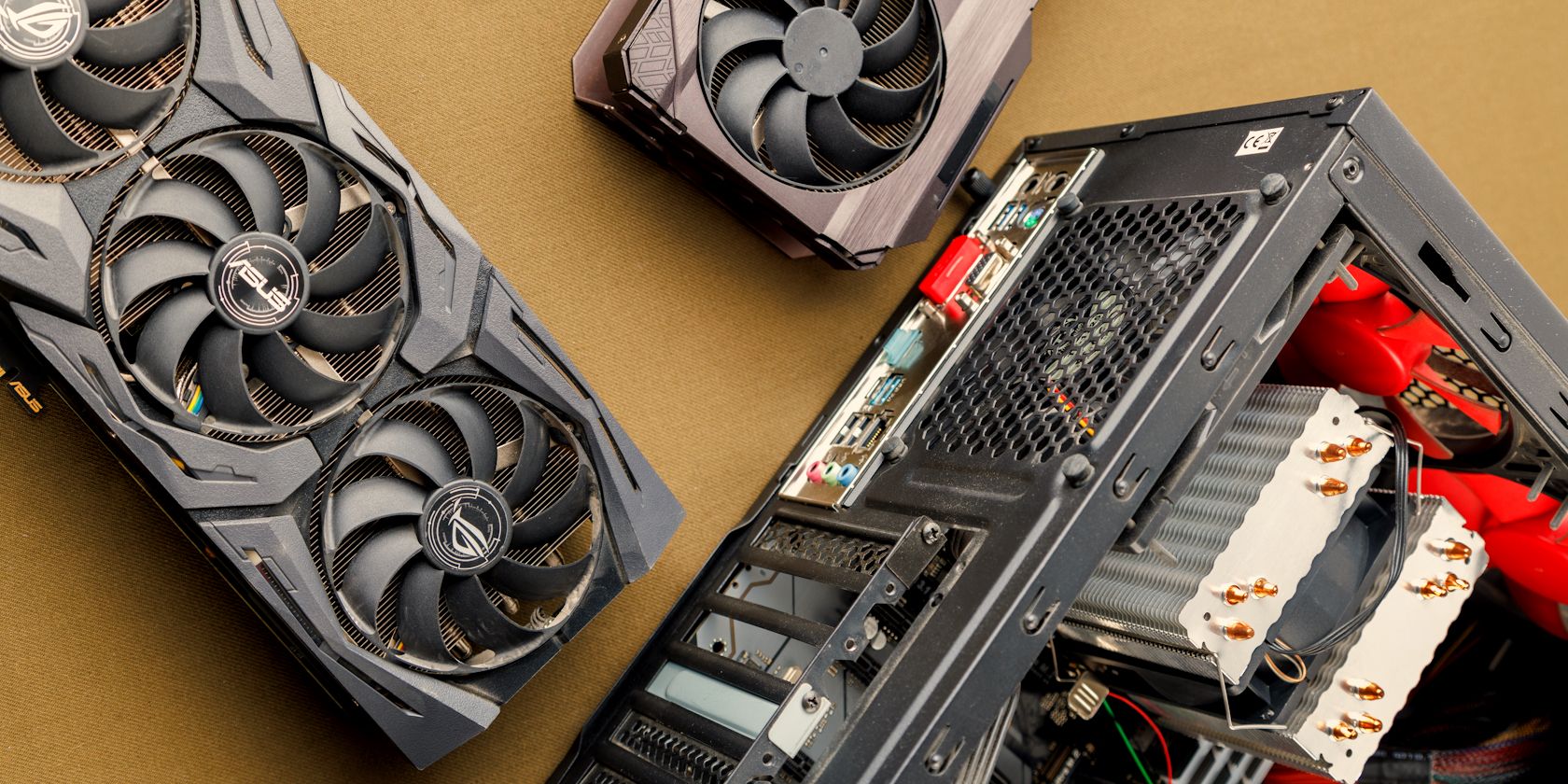
Battle of the Chips: Winning Gamer's CPU?

Battle of the Chips: Winning Gamer’s CPU?
Quick Links
- Intel 14th-Gen vs. AMD Ryzen 7000 Series Processors
- High-End Gaming: Intel Core i9-14900K vs. AMD Ryzen 9 7950X3D vs. AMD Ryzen 9 7900X3D
- Mid-Tier Gaming: Intel Core i7-14700K vs. AMD Ryzen 7 7800X3D
- Entry-Level Gaming: Intel Core i5-14600K vs. AMD Ryzen 5 7600X
- So, Should You Buy AMD or Intel?
Key Takeaways
- AMD Ryzen chips outperform Intel processors in high-end gaming, but Intel offers a more affordable option.
- Specifications alone don’t determine gaming performance; benchmark results are crucial.
- When choosing a gaming CPU, consider factors such as reviews, gaming benchmarks, and on-paper specifications, like process node, number of cores, clock speed, and cache size.
When building a gaming PC, the first thing you’ll likely choose is the CPU brand—are you going Team Blue with the traditional Intel processor? Or will you pick the newer AMD and their Ryzen chips?
Intel 14th-Gen vs. AMD Ryzen 7000 Series Processors

We matched the latest-generation chips at the same or similar price range to keep a level playing field. However, since the AMD Ryzen 9 7950 is in a price class of its own, we added it to the top-end processors to see how it compares against Intel’s best.
We also won’t list the process node of each Intel and AMD chip as they’re fixed across this generation of processors. Intel uses the Intel 7 process, which employs the 10nm Enhanced SuperFin process, while AMD uses TSMC’s 5nm process.
Aside from this, you should also note that 14th-Gen Intel processors use P- and E-cores , while AMD chips only use similar cores.
High-End Gaming: Intel Core i9-14900K vs. AMD Ryzen 9 7950X3D vs. AMD Ryzen 9 7900X3D

The high-end gaming PCs are the most expensive systems you can buy. These computers typically start at $2,000 with no upper limit. So, if that’s what you’re after, let’s compare the top processors from Intel and AMD.
| Processor | Cores (Threads) | Base Clock Speed (GHz) | Turbo Clock Speed (GHz) | L3 Cache (MB) | Max TDP (W) | Price | |||
|---|---|---|---|---|---|---|---|---|---|
| P-Cores | E-Cores | P-Cores | E-Cores | P-Cores | E-Cores | ||||
| Intel Core i9-14900K | 8 (16) | 8 (16) | 3.2 | 2.4 | 5.8 | 4.4 | 36 | 253 | $589 |
| AMD Ryzen 9 7950X3D | 16 (32) | 4.2 | 5.7 | 32+96 | 120 | $699 | |||
| AMD Ryzen 9 7900X3D | 12 (24) | 4.4 | 5.6 | 32+96 | 120 | $599 |
When you look at the numbers on paper, the 14900K matches the 7950X3D based on core count. Both AMD chips have a higher base clock speed than Intel’s offering, but Intel beats them with its turbo clock speed. Despite this, the X3D’s massive L3 cache is known to give AMD an advantage in gaming.
Still, these numbers don’t mean anything in the real world. Unfortunately, we cannot find benchmark results that featured all three processors together, so let’s first see how the 7950X3D compares against the 14900K from Gamer Nexus’ test .
| Average FPS | Intel Core i9-14900K | AMD Ryzen 9 7950X3D |
|---|---|---|
| Rainbow Six Siege (1440p / Very High) | 511.2 | 520 |
| F1 23 (1440p / High) | 392.8 | 400.1 |
| Baldur’s Gate 3 (1440p / Medium) | 107.6 | 121.7 |
| Final Fantasy XIV (1440p / Maximum) | 269 | 212.6 |
| Starfield (1080p / High) | 123 | 102.5 |
As you can see, there are mixed results between the 14900K and the 7950X3D. While the latter usually performs better, the 14900K gains a massive advantage on a couple of titles.
Now, let’s see how the 7900X3D performs against its more powerful sibling. Again, we’re using Gamer Nexus’ results, which used the same PC configuration as the previous test.
| Average FPS | AMD Ryzen 9 7950X3D | AMD Ryzen 9 7900X3D |
|---|---|---|
| Rainbow Six Siege (1080p / Very High) | 840.9 | 808.6 |
| Final Fantasy XIV (1080p / Maximum) | 255.9 | 250.5 |
| Shadow of the Tomb Raider (1080p / Medium) | 382.6 | 334.7 |
| CSGO (1440p / Very High) | 383.9 | 386.9 |
| Cyberpunk 2077 (1080p / Medium) | 267.6 | 255.7 |
| Far Cry 6 (1080p / High) | 198.2 | 194.7 |
Given that the 7950X3D is the faster, more expensive model, it just makes sense that it will perform better than the 7900X3D. But how will the 7900X3D perform against the 14900K? This time, let’s look at the results of Mark PC .
| Average FPS | Intel Core i9-14900K | AMD Ryzen 9 7900X3D |
|---|---|---|
| God of War (4K / Ultra) | 113 | 110 |
| Cyberpunk 2077 (4K / Ultra) | 83 | 82 |
| Assassin’s Creed Valhalla (4K / Ultra) | 123 | 104 |
| Watch Dogs Legion (4K / Ultra) | 114 | 99 |
| Red Dead Redemption II (4K / Favor Quality) | 133 | 119 |
According to the test results, the 7950X3D is the best performer, but by a small margin over the 14900K. On the other hand, the 14900K easily overcomes the 7900X3D.
This means AMD is the better option for high-end gaming because of its raw horsepower. However, if you consider the prices of these chips, you might want to choose Intel’s processor instead because it’s the cheapest of the bunch. But does cost really matter at this price point?
Mid-Tier Gaming: Intel Core i7-14700K vs. AMD Ryzen 7 7800X3D

Mid-range builds start from $750 to $2,000 and usually use the Intel Core i7-14700K or the AMD Ryzen 7 7800 X3D.
| Processor | Cores (Threads) | Base Clock Speed (GHz) | Turbo Clock Speed (GHz) | L3 Cache (MB) | Max TDP (W) | Price | |||
|---|---|---|---|---|---|---|---|---|---|
| P-Cores | E-Cores | P-Cores | E-Cores | P-Cores | E-Cores | ||||
| Intel Core i7-14700K | 8 (16) | 12 (12) | 3.4 | 2.5 | 5.6 | 4.3 | 33 | 253 | $409 |
| AMD Ryzen 7 7800X3D | 8 (16) | 4.2 | 5.0 | 96 | 120 | $449 |
If we look at their specifications, we can expect the 14700K to beat the 7800X3D handily with its greater core number and higher turbo clock speed. But will that really transpire in gaming? Let’s check eTeknix’s gaming benchmark results to see what they tell us.
| Average FPS | Intel Core i7-14700K | AMD Ryzen 7 7800X3D |
|---|---|---|
| Far Cry 6 (4K / High) | 122 | 135 |
| Baldur’s Gate 3 (4K / Ultra) | 138 | 145 |
| Call of Duty: Modern Warfare II (4K / Ultra) | 141 | 142 |
| Cyberpunk 77 (4K / Ultra) | 66 | 68 |
| Marvel’s Spider-Man Remastered (4K / Very High) | 131 | 140 |
Although the 14700K looks better on paper than the 7800X3D, the latter outshines it in all the tested games. That’s why you cannot judge a processor based on its specifications and whatever the presenter says on the stage.
Entry-Level Gaming: Intel Core i5-14600K vs. AMD Ryzen 5 7600X

teh_z1b/Shutterstock
Even if you don’t have much budget, both Intel and AMD offer processor options for gamers. These chips are affordable but still deliver some performance most games need. Although you can still buy cheaper processors, we don’t recommend them as they will likely struggle in gaming.
| Processor | Cores (Threads) | Base Clock Speed (GHz) | Turbo Clock Speed (GHz) | L3 Cache (MB) | Max TDP (W) | Price | |||
|---|---|---|---|---|---|---|---|---|---|
| P-Cores | E-Cores | P-Cores | E-Cores | P-Cores | E-Cores | ||||
| Intel Core i5-14600K | 6 (12) | 8 (8) | 3.5 | 2.6 | 5.3 | 4.0 | 24 | 181 | $319 |
| AMD Ryzen 5 7600X | 6 (12) | 4.7 | 5.3 | 32 | 105 | $299 |
Again, we will look at gaming benchmarks. This time, we’ll check Testing Games’ results and see how the two processors compare.
| Average FPS | Intel Core i5-14600K | AMD Ryzen 5 7600X |
|---|---|---|
| Cyberpunk 2077 (1080p / Ultra) | 108 | 93 |
| Starfield (1080p / Ultra) | 108 | 95 |
| Red Dead Redemption II (1080p / Ultra) | 169 | 170 |
| The Witcher III (1080p / Ultra) | 90 | 81 |
| Forza Horizon 5 (1080p / Ultra) | 185 | 180 |
The gaming tests show that the 14600K performs better than the 7600X despite having a lower base clock speed and the same turbo clock speed. This is probably because the former has eight efficiency cores, allowing it to offload background tasks to these less powerful cores, ensuring that whatever game you’re playing doesn’t have to compete for computing resources.
So, Should You Buy AMD or Intel?
We can see in the gaming benchmarks above that average FPS results do not reflect the specifications on paper. Based on the results, there’s no clear winner between both CPU makers. While AMD and Intel are neck-and-neck at the top end of the market, the former demolishes the latter in mid-range gaming—so much so that some high-end gaming PCs use the 7800X3D instead. But when it comes to budget processors, Intel remains king.
If you’re on a no-holds-barred mission to build the most powerful gaming PC, then yes, AMD is the best gaming CPU. But if you’re looking for a balance between price and power, the line becomes a bit more blurred as you must consider other aspects like your existing system and the compatibility of more affordable parts like DDR4 RAM.
- Title: Battle of the Chips: Winning Gamer's CPU?
- Author: William
- Created at : 2024-09-12 16:17:15
- Updated at : 2024-09-15 16:00:08
- Link: https://games-able.techidaily.com/battle-of-the-chips-winning-gamers-cpu/
- License: This work is licensed under CC BY-NC-SA 4.0.